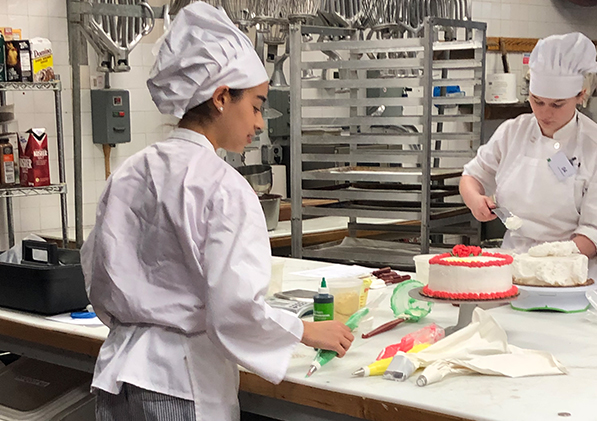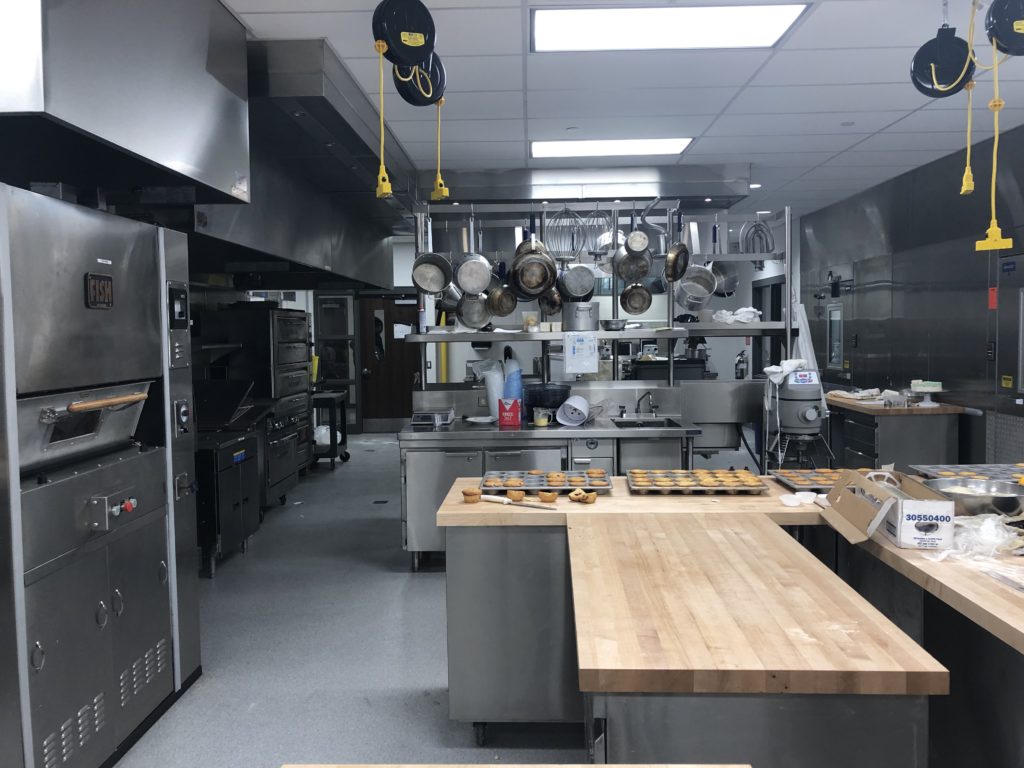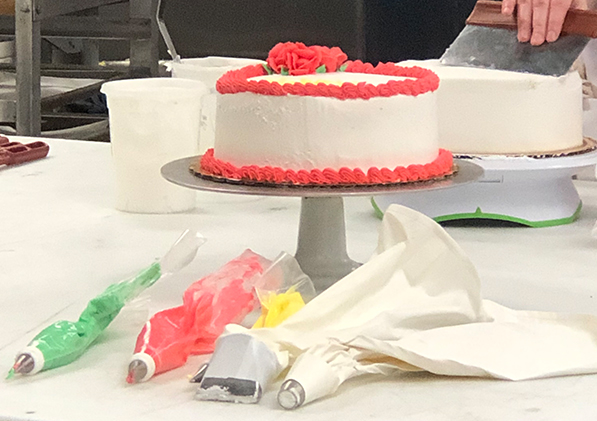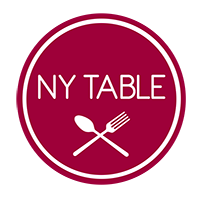
The classroom kitchen at the Donald Payne Technical School in Newark is state of the art; steel equipment shines under the florescent lights and everything is clean and orderly. While chefs Amarilys Olivo Mockabee and Eddie Encarnacion are always proud of their work quarters, today they’re especially proud to show off the newest tool, a brand-new temperature-controlled oven.
“I’m really excited to use this baby, last week I was cooking some muffins and with some of our other ovens just can’t keep the temperature steady if you walk away from them,” said Encarnacion. “Once we get these working, though, we’ll be able to do anything.”
Encarnacion is a former Culinary Institute of America graduate who has been teaching with Essex County schools for close to a decade, while Mockabee came to Payne Tech in 2017, equipped with the knowledge of farm to table practices she learned when she got into cooking two decades ago. Together, they are two of the three chefs who teach at Payne Tech.
For the last 100 years, Essex County’s technical school system has provided students from freshman through senior year of high school “Career Technical Education” in every one of their three schools, and the culinary arts program has been a part of the tech school curriculum since the school’s conception. Its goal has always been to teach technical skills, knowledge, and attitudes necessary for successful performance in a globally competitive workplace, but it also provides the underprivileged kids of Newark, New Jersey’s inner city with a type of education they wouldn’t find elsewhere.
“Some of these kids don’t even know these types of foods exist, let alone have an opportunity to eat well while at home. Where we are, people might only have access to fast food and may have no knowledge when it comes to how to prepare a meal,” said Cathleen Smith, the social supervisor at Payne Tech, who is responsible for overseeing the school’s interaction with its students. “That’s why the goal has always been that we welcome these kids in, get them off the street, and teach them a world where they can ultimately have as much experience and success as if they were any other profession.”
Students can join the culinary program at Payne Tech as freshmen, and will learn cooking techniques during their first year, but they don’t get to jump into cooking immediately. The program is designed to teach students every single aspect of the culinary industry, which means learning about appliances, cleaning, working in the front and back of a restaurant, and even how to be a maître d, all before they pick up a knife. Only then do they learn basic baking and cooking skills, which includes how to pair new flavors they’ve never experienced.

“The other day Chef Encarnacion had the students prepare brie and green apple tarts for each other to eat, and a lot of the students had this curious look on their face, not really knowing what to expect,” said Smith. “Then when they got to try it you could tell it was this new experience that they really seemed to enjoy.”
This year, with the addition of Mockabee to the staff, the students have begun learning more about farm to table practices. Through lectures, books, and seminars with local Essex County farmers, the students will gain insight into how to undertake their own farm to table responsibilities, including growing and harvesting their own produce. They’ll eventually learn how to raise their own livestock.
“I think a lot of the students have taken a liking to the process of being able to reap your hard work. You can see them admire their success when they’re looking over a bushel of apples they’ve grown or carrots they’ve harvested,” said Mockabee. “Farm to table practices are really a giant industry right now and Payne tech is fortunate enough to have its own small farm space right on campus. With these benefits it’ll only help contribute to the students success and if they can learn about these practices they can succeed in the current culinary industry.”
Learning practices like farm-to-table might also help the students get a job in the local community after graduation, thanks to the need in the industry
“I would certainly hire a student who was versed in farm to table practices if they knew what they were doing after four years of culinary training at the VoTech,” said Jimmy Spango, an Essex County resident and part-owner of the Star Light Restaurant, located in West Orange, NJ. “I think when you teach kids about topics like this in school it gives a better understanding which is better for the business. It’s like teaching computers to a younger person versus an older person. The younger generation will probably grasp it better. I think it’s great for business.”
While the Payne Tech curriculum is teaching so many culinary techniques, John P. Dolan, career technical education director, would like to do even more, but is limited, he says, by technical school requirements.

“As much as we want to go toe to toe with these schools like Manhattan Food & Finance High we can’t because we have to reach these somewhat unreasonable standards set by the state,” said Dolan, referring to the limits Payne Tech still has in curriculum. “We only get to give the students 80 minutes a day where they are learning their core career teachings, and the student’s math, science, and history courses aren’t teaching culinary-based material. Meanwhile they also have to fulfill a visual art requirement which is opposite to learning about food. I’ve always asked, why can’t learning about cake decoration or food art fulfill that?”
Encarnacion agreed.
“I say it so much I’m like a broken record,” he said. “Just give me more time. More time to teach the students what they did right or could have been better. It’s only going to be more beneficial to them.”
A spokesperson for the New Jersey Department of Education did not respond to multiple requests for comment. /
Despite the curriculum requirements, the culinary program is popular with students.
“The culinary program here continues to be the major that most students at Payne Tech want to ballot into,” said Smith. “There are 1300 students at Payne tech and there were 325 students in Payne Tech’s last freshman class. In that grouping, 130 applied to get into the culinary program and of that number we selected 39. Even with the shift in culinary techniques and so many high-profile chefs being in the “Me Too” movement, it hasn’t stopped us from getting hundreds of students a year who want in.”
“Once they come in, we see some really good students,” said Smith. “We have them competing in state wide baking competitions at Skills USA, Family, Career and Community Leaders of America, and ProStart, they’re getting culinary school training from a chef like Eddie who went to the Culinary Institute of America, and the city is using our students to cater events. There’s an exciting eagerness to learn, and we love to see that.”
Tags: #CulinaryClass, #FoodIssues, cooking, Culinary Education, Food, food education, food issues, New Jersey, Student Chefs
Your Comments